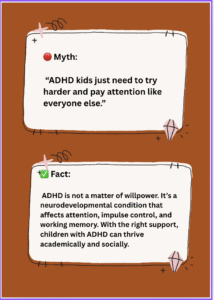Hello, fellow parent! Are you ready to embark on the adventure of advocating for your child with ADHD in the school system? As a mom with ADHD myself, I understand the ups and downs of this process. It can be challenging, exhausting, and at times, it might feel like you’re speaking a completely different language from the school staff. Dealing with endless meetings and misunderstandings is no small feat, and the long-term impact of effective advocacy is certainly serious business. Ensuring your child receives the support they need in school not only sets them up for academic success but also lays the groundwork for their confidence and well-being in the years to come. So, let’s dive in and transform those advocacy hurdles into meaningful victories!
Understanding ADHD and Its Impact on Learning
Imagine this: your child with ADHD is sitting at their desk, but instead of focusing on the lesson about long division, their mind is off on a grand adventure, dodging distractions like a hero in a video game. While ADHD can be a superpower in many ways, it can also make concentrating, organising thoughts, and finishing assignments feel like scaling a mountain. Bright kids may find themselves struggling not because they lack the intelligence, but because their brains have a different way of processing information – like trying to listen to music while the volume is cranked up on everything else.
This disconnect can lead to feelings of frustration and low self-esteem. Without proper support, these struggles can have long-lasting effects, leading to challenges in higher education and beyond. But… There are strategies we can implement to help your child cope and shine in the classroom and beyond.

Tip 1: Build a Positive Relationship with Your Child’s Teachers
Think of your child’s teachers as your allies in this quest. Building a positive and collaborative relationship with them is crucial. Think of it as creating a partnership where everyone is committed to providing the best possible learning environment for your child. Teachers are on the front lines, observing your child’s behaviour and progress daily. If they understand your child’s unique needs and difficulties, they are more likely to be supportive, flexible, and proactive in finding solutions. Without this relationship, misunderstandings can arise, leaving your child without the essential support they need.
Schedule Meetings: Regular meetings with your child’s teachers are essential for maintaining open lines of communication. This is your opportunity to align strategies and share updates on your child’s progress. When you demonstrate your commitment to their success, you inspire the teacher to be just as invested. It’s like a buddy system where everyone watches out for each other!
Share Information: Imagine walking into a room where everyone speaks a different language. That’s how it can feel when teachers don’t fully understand ADHD. Sharing information about your child’s unique needs helps teachers see the bigger picture. Instead of misinterpreting behaviour as lazy or rude, they become your child’s advocates. When you frame this information in a friendly and engaging manner, you turn potential misunderstandings into valuable support.
Be Proactive: Being proactive is like being the coach of your child’s team – anticipating challenges before they become crises. By discussing potential concerns early, you and the teacher can brainstorm solutions together. This is like staying one step ahead in a reality show: by managing situations proactively, you reduce the risk of meltdowns and misunderstandings.
Tip 2: Request Accommodations and Support Services
Requesting accommodations and support services is one of the most powerful tools in your advocacy toolkit. It’s your way of ensuring that the school becomes a nurturing space where your child can thrive academically and socially.
Educational Assessments: Requesting a comprehensive educational evaluation is a crucial first step. Think of requesting a comprehensive educational evaluation as ordering from the finest menu at a restaurant. This is your chance to customise an educational plan specifically for your child. These assessments reveal where your child might need support – be it in focus, processing speed, or working memory. With this knowledge, you and the school can craft targeted interventions tailored to your child’s unique challenges.
Accommodations: Accommodations can be the secret sauces that help your child succeed. Don’t hesitate to get creative when requesting them! They can include extended test-taking time, flexible seating arrangements, or visual aids. Consider these requests your “special orders” that help level the playing field for your child.
Support Services: Advocating for additional support services is like casting the perfect supporting actors for your child’s life story. Whether it’s tutoring, counselling, or behavioural therapy, these services provide crucial support beyond the classroom, helping your child develop skills to tackle ADHD-related challenges. By rolling out the “red carpet” for these resources, you signal your dedication to your child’s future success.
Tip 3: Foster Self-Advocacy Skills in Your Child
One of the most valuable gifts you can give your child is the ability to advocate for themselves. Encouraging self-advocacy fosters a sense of responsibility and confidence that will serve them well throughout their lives. When children understand how to express their needs and seek support, they become active participants in their own education and life journey.
Teach Self-Awareness: Think of helping your child develop self-awareness as planting the seeds in their personal garden – each one representing a unique strength waiting to blossom!! Encourage them to understand how ADHD affects their learning and behaviour. Help them recognise their “superpowers” (like creativity and problem-solving) and their “kryptonite” (like distractions and time management issues). With this self-awareness, they can anticipate challenges and devise strategies that work for them.
Practicing assertiveness: This is key to helping your child effectively communicate their needs. Role-playing scenarios, such as asking a teacher for help or explaining a problem, gives your child the tools they need to navigate real-life situations with confidence. Think of it as rehearsing for a school play – by practicing in a safe, low-pressure environment, your child can build their communication skills and become more comfortable speaking up.
Encourage Problem-Solving: Instilling problem-solving skills in your child is like teaching them to approach challenges with the curiosity of a detective. When they encounter obstacles – like figuring out homework or managing time – guide them through the process of finding solutions. By putting on your metaphorical detective hats and working through the challenges together, you empower them to tackle problems independently.
Tip 4: Stay Informed and Engaged in the Education Process
Becoming an active participant in your child’s education is like starring in your own reality show – filled with twists, turns, and plenty of excitement! Staying engaged helps you gain insights into your child’s educational experience while allowing you to advocate effectively for their needs.
Attend School Events: Showing up to school meetings and events is crucial. Attend with the enthusiasm of walking the red carpet because your presence sends a strong message that you are invested in your child’s education. Participating keeps you informed about school policies, resources, and opportunities that can benefit your child.
Stay Informed about ADHD: Keep yourself updated on ADHD by subscribing to newsletters, reading books, and joining online communities. Knowledge is power, and being informed about the latest research, strategies, and resources empowers you to advocate effectively.
Build a Support Network: Creating a network of fellow parents, educators, and professionals can be a game-changer. Connecting with others who understand the challenges of ADHD provides invaluable insights and shared experiences. Think of it as forming your own superhero squad – together, you can support one another and share resources, ideas, and strategies.
Conclusion
Navigating the school system as an advocate for your child with ADHD might sometimes feel like trekking through a complex maze, but with the right strategies in your arsenal, you can emerge victorious! Remember to cultivate positive relationships with teachers, request the necessary accommodations, foster self-advocacy skills, and stay informed about your child’s education. When you approach advocacy with a sprinkle of humour, a lot of heart, and a determination that rivals any superhero, you empower your child to thrive academically and socially. So take a deep breath, channel your inner super-parent, and let’s embark on this exciting journey together!
Learn Best Homework Tips for Kids with ADHD: How to Create a Productive Routine


